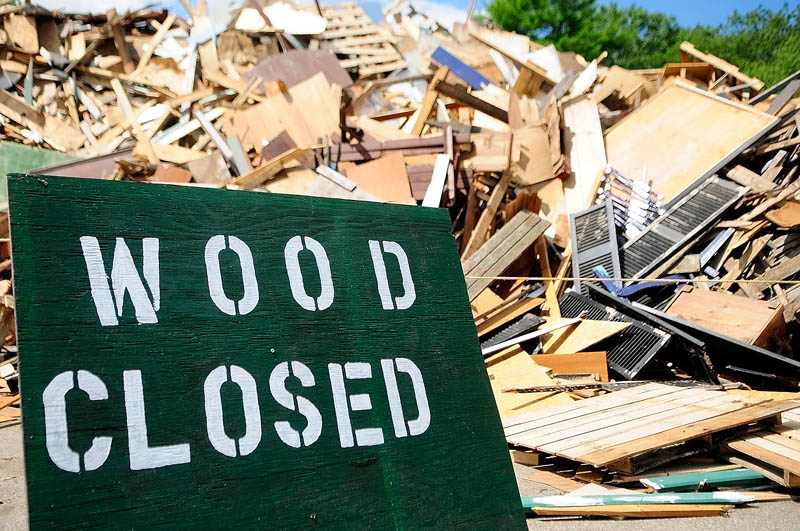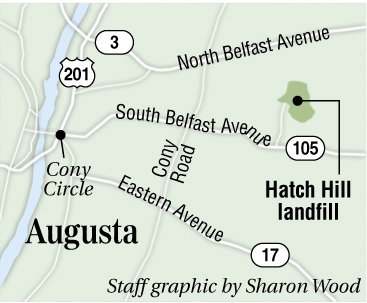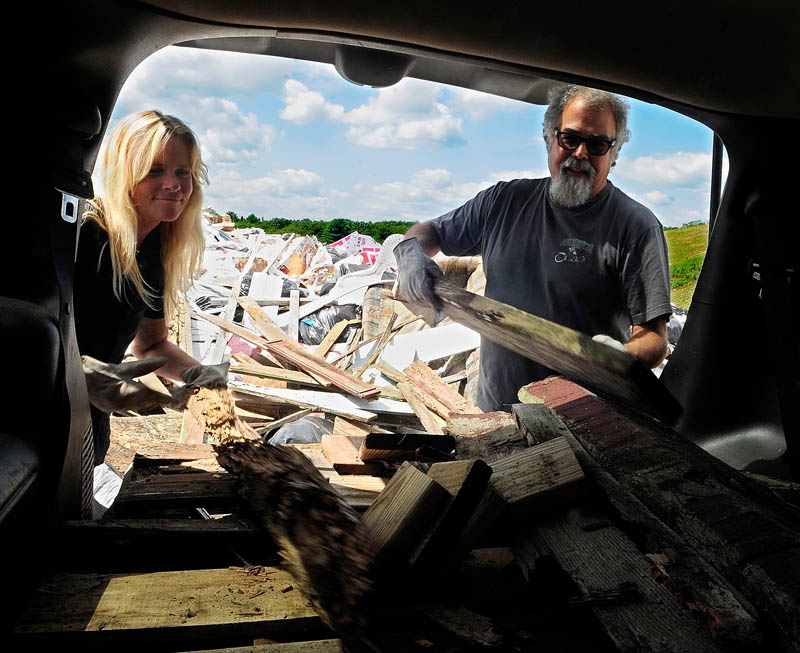AUGUSTA — Old lumber and scrap wood that used to be ground up, trucked off and burned to make electricity is instead being dumped in the general landfill, following a new directive by Hatch Hill officials.
The cause of the change can be traced, somewhat circuitously, through biomass plants in Stratton and Livermore Falls, back to the effect a recent change in Connecticut law about renewable energy credits had on a New York-based renewable energy firm.
While that explanation may sound somewhat convoluted, the result, for now, is fairly simple.
Construction and demolition debris wood that once helped make energy is, instead, taking up space in the landfill, where it will lie, indefinitely, until it decomposes.
“We no longer have an outlet for chipped demo wood, so we’re landfilling it,” said Lesley Jones, public works director. “We’re not that happy about it, because it’s taking up landfill space.”
Jones said other landfills in the state also are enduring the change.
Hatch Hill in Augusta, which takes waste from Augusta residents and businesses and eight surrounding communities, previously had its construction and demolition debris wood chipped and sent to ReEnergy renewable energy electric plants in Stratton and Livermore Falls.
Both those plants recently stopped taking such wood waste.
“We suspended using that material, which, unfortunately, has caused some hardship to us and our suppliers,” said Sarah Boggess, a spokesperson for New York-based ReEnergy Holdings. “We’re hoping circumstances will change.”
The plants stopped using demolition debris wood because of the June 5 enactment of changes to rules in Connecticut on renewable energy credits, according to Boggess and Greg Leahey, senior vice president of asset management for ReEnergy.
The changes, she said, mean energy produced with construction and demolition wood no longer qualifies for class 1 renewable energy credits. The firm had been selling renewable energy credits generated by its operations in Maine in the Connecticut renewable energy credits market.
ReEnergy’s Maine plants still are operating, but now they make electricity using only “green” biomass, such as brush and other forest material, which is still eligible for renewable energy credits.
Renewable energy credits obtained by creating energy from renewable sources generally can be sold to other companies to help offset penalties for pollution they create.
Leahey said the credits produced in one state can be bought in another as long as they meet the other state’s requirements.
“We were able to produce biomass credits from the state of Maine that qualify in the state of Connecticut,” Leahey said. “It’s a market just like any other market, for (credits) produced at facilities in the state of Maine.”
The company, Boggess and Leahey said, has petitioned regulators in Connecticut to be able to burn at least a mixture of green biomass and construction and demolition debris wood at its Maine plants and still receive renewable energy credits it can sell in Connecticut.
Jones said Hatch Hill kept taking in demolition debris wood after the change until its space for stockpiling wood filled up. And there it remains.
Meanwhile, residents and other users of Hatch Hill taking scrap lumber there are being told to put it in the landfill with the rest of their rubbish.
Brush taken to Hatch Hill still is being set aside and chipped and trucked off for reuse elsewhere, as the change doesn’t affect such “cleaner” wood.
Jones said she hopes to find another outlet for Hatch Hill’s demolition debris wood over the next couple of weeks.
John Thomas, manager of the Oakland transfer station, said Oakland collects demolition debris wood from Oakland and several other area municipalities and periodically has Marshall Grinding grind it up so it can be taken to a biomass plant to be burned. He was not aware of any issues with getting rid of the material in that manner.
Officials at Chelsea-based Marshall Grinding could not be reached for comment today on whether the ReEnergy plants’ action had affected the company.
Jessamine Logan, director of communications for the state Department of Environmental Protection, said Maine officials had expressed concern that the out-of-state renewable-energy credits change could have exactly the effect it now appears to be having in Augusta.
However, she said, other Maine facilities have air emission licenses that allow them to burn construction and demolition debris wood, so Hatch Hill officials might be able to find another place to send that material.
Keith Edwards — 621-5647
kedwards@centralmaine.com
Send questions/comments to the editors.






Success. Please wait for the page to reload. If the page does not reload within 5 seconds, please refresh the page.
Enter your email and password to access comments.
Hi, to comment on stories you must . This profile is in addition to your subscription and website login.
Already have a commenting profile? .
Invalid username/password.
Please check your email to confirm and complete your registration.
Only subscribers are eligible to post comments. Please subscribe or login first for digital access. Here’s why.
Use the form below to reset your password. When you've submitted your account email, we will send an email with a reset code.